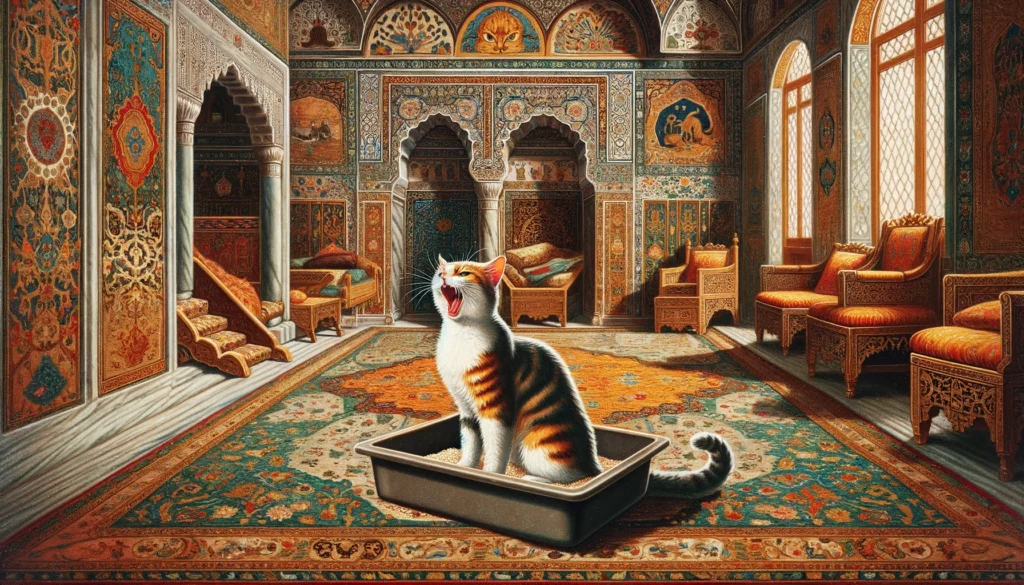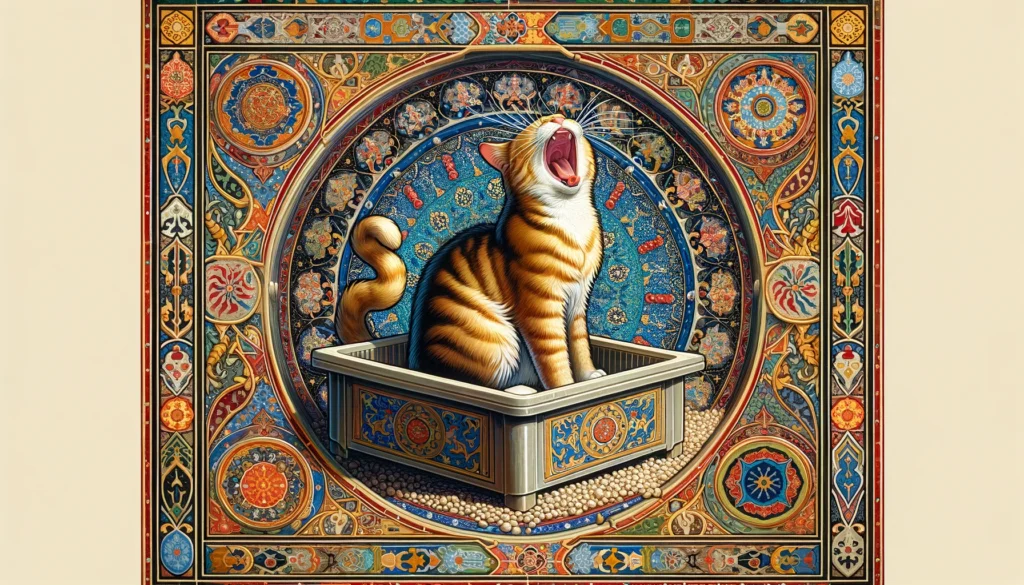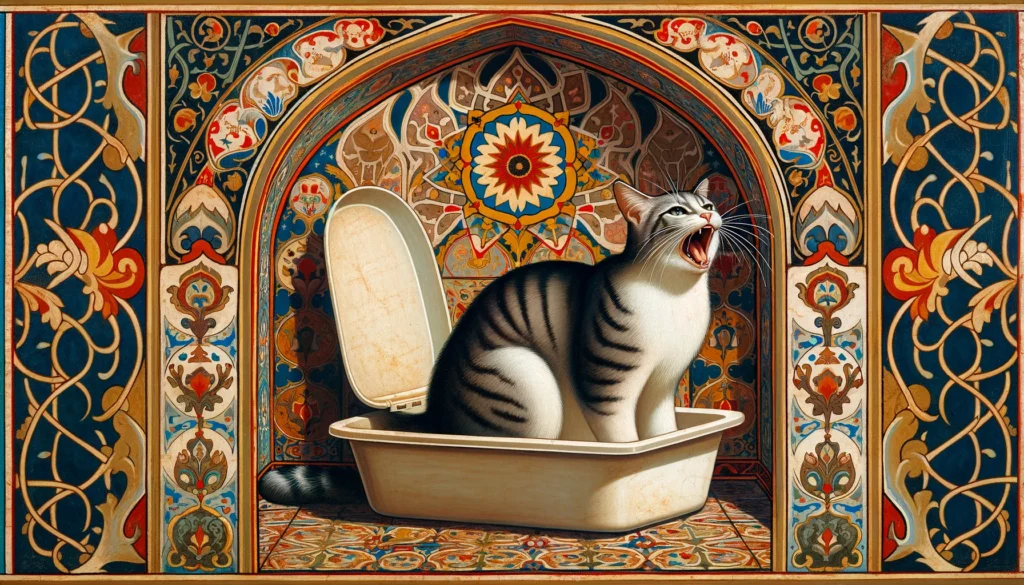Why is my cat meowing in the litter box? This behavior could stem from several different root causes, each of which offers a glimpse into their health and mindset, acting as a dialogue they share with us.
Sometimes, this behavior is merely a quirk, but other times, it could hint at discomfort or a call for attention. Delving into the reasons behind these vocalizations can help ensure your cat’s well-being and comfort.
Cat litter plays a pivotal role in this equation, influencing their bathroom behavior and overall satisfaction. Addressing this query requires understanding both the psychological and physical aspects that influence our feline friends.
Key Takeaways: Understanding Your Cat’s Litter Box Meows
- Identifying the Cause: Cats meow in the litter box for various reasons, including medical issues, discomfort, or behavioral factors.
- Seeking Veterinary Advice: Always consult a vet to rule out or treat any potential health problems.
- Environmental and Behavioral Considerations: Assess and improve the litter box environment and maintenance to ensure it meets your cat’s needs.
- Observation and Action: Pay close attention to your cat’s behavior and litter box habits to quickly address any issues.

You might also like the following: Why Do Cats Play In Their Litter Box? 8 Things to Know
Decoding Cat Communication and Meowing
Cats meowing in the litter boxes serves as a primary form of cat communication, especially around their litter boxes.
- Cats use meows to express a wide range of emotions and needs.
- The litter box becomes a spot for vocal expression due to its significance in a cat’s routine.
- Understanding the nuances can help owners address their cat’s concerns promptly.
1: The Basics of Cats Meowing
Cats meow before they poop as a behavioral issue signal, possibly to scare away predators.
- Meowing signals the cat’s presence and readiness to use the litter box.
- This behavior could be an instinctive action to ward off potential threats.
- Recognizing this can help pet owners create a safer environment for their felines.
2: When Meowing Indicates a Problem
A past tense concern, why was my cat meowing in the litter box, can signal a health issue, necessitating a vet visit.
- Sudden changes in meowing patterns may indicate discomfort or distress.
- A vet check-up can uncover any underlying health issues causing the behavior.
- Prompt attention to these signals can prevent further health complications.
🐱🗣️🕵️♂️
Uncovering Health Concerns Through Meows
Meowing in the litter box often points to underlying health concerns like urinary problems in cats.
- Urinary issues can significantly affect a cat’s comfort and behavior.
- Recognizing changes in meowing can be a crucial indicator of health problems.
- Early detection and treatment of these issues are vital for the cat’s well-being.
3: Painful Conditions and Urinary Problems
Conditions like UTIs and cystitis are health concerns prompting cries from the discomfort.
- UTIs and cystitis lead to painful urination, making visits to the litter box distressing.
- Increased frequency of meowing may signal discomfort or pain.
- Consultation with a veterinarian is crucial for diagnosis and relief.
4: Digestive Issues and Litter Box Aversion
Worm infestations and intestinal blockages, leading to litter box aversion, cause discomfort, prompting meows of distress.
- Intestinal blockages obstruct the passage of bowel movements, causing pain.
- Litter box aversion can develop if the cat associates the box with discomfort.
- Timely veterinary intervention can alleviate these issues and restore normal behavior.

You might also like the following: 5 Reasons Why Cats Dig in the Litter Box
Behavioral Insights: Litter Box Preferences and Social Communication
Beyond health issues, litter box preferences significantly influence why cats meow in the litter box.
- Personal preferences dictate a cat’s acceptance or rejection of a litter box.
- The right environment can enhance a cat’s comfort and willingness to use their designated area.
- Observing a cat’s behavior can provide insights into their preferences and needs.
5: Understanding Litter Box Preferences
Cats have specific likes regarding litter box cleanliness, size, and location.
- A clean litter box is crucial; cats avoid dirty environments for their bathroom needs.
- The size and location of the litter box can greatly affect a cat’s comfort and security.
- Regular maintenance and strategic placement cater to a cat’s inherent cleanliness and privacy preferences.
6: Meowing as Social Behavior
Some cats announce their activities for attention, a form of cat communication.
- Meowing post-use can indicate a request for clean-up or simply sharing their accomplishment.
- This behavior strengthens the bond between cats and their owners, serving as a form of interaction.
- Recognizing and responding to these meows can encourage positive social behaviors and satisfaction.
Environmental and Stress-Related Meowing
The environment and social dynamics significantly influence stress-related meowing.
- The surroundings and group dynamics play a crucial role in a cat’s vocal expressions.
- Stressors in the environment can lead to increased meowing as a sign of discomfort or need.
- Understanding these factors is key to creating a harmonious living space for feline companions.
7: The Impact of Multi-Cat Households
In homes with multiple cats, stress-related meowing can be more prevalent.
- The dynamics within multi-cat households can introduce competition or anxiety, reflected in vocal behavior.
- Ensuring enough litter boxes—one per cat plus one extra—can alleviate some stress.
- Observing and adjusting the living environment can reduce stress-induced meowing.
8: Health Concerns and Environmental Stressors
Diarrhea and feeling unwell can lead to meowing after pooping, indicating environmental stress or discomfort.
- Health issues, such as gastrointestinal discomfort, can cause cats to communicate distress through meowing.
- A change in appetite or behavior, like a cat not eating much but acting normal, may hint at underlying stress.
- Addressing both health and environmental factors is crucial for reducing stress and improving well-being.

Frequently Asked Questions
Q: Why is my cat crying in the litter box?
A: If your cat is crying in the litter box, it may be due to discomfort or pain during elimination, often a sign of bladder stones, blockages, or other medical conditions. It’s important to observe if they’re frequently entering the litter box or showing signs of tenderness in their abdomen.
Q: Why is my cat laying in the litter box meowing?
A: A cat lying in the litter box and meowing could be signaling discomfort while urinating or defecating, or it might find the litter box’s environment unpleasant. If the litter box is in an uncomfortable place or if it smells bad, these could be reasons for this behavior.
Q: Why is my cat meowing and playing in the litter box?
A: If your cat has always meowed while using the litter box, it’s likely not a concern. However, if this is a new behavior, it could indicate a medical problem, especially if your cat is straining without producing anything, which requires urgent veterinary care.
Q: Why does my cat meow and dig in the litter box?
A: Excessive meowing and digging in the litter box could be due to discomfort, marking territory, or seeking attention. If this behavior is accompanied by signs of distress or is a sudden change, it’s recommended to consult with a veterinarian to rule out any health issues.
Further Reading
Why Is My Cat Meowing So Much?
The Cat’s Meow! Caterwauling in Cats
Wrapping Up: Decoding Your Cat’s Litter Box Language
In conclusion, a cat’s meowing in the litter box is a unique form of communication that requires attentive understanding and response. It’s like they’re using their own secret language, and it’s our job to interpret it. This article has delved into the various reasons why our feline friends might vocalize in their Cat Litter box, emphasizing the importance of recognizing these signs to ensure their comfort and health.
We’ve explored how meowing can signal everything from discomfort to stress, and the importance of a clean, comfortable litter box environment. Remember, each cat is an individual, and their reasons for meowing can vary. Paying close attention to your cat’s behavior is crucial, and seeking veterinary advice when in doubt is always a wise decision.
So, what can you do as a cat owner? Keep an eye on your cat’s litter box habits. Make note of any changes in frequency or type of vocalization, and don’t hesitate to reach out to your vet if something seems off. Also, consider the setup of your litter box – is it in the best possible location? Is it the right type of litter for your cat?


